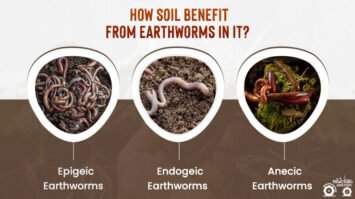
So, why should we care about these little wigglers? Well, soil erosion is a big issue that affects not just gardens, but entire ecosystems. It happens when topsoil—the nutrient-rich layer that plants need—gets washed or blown away. This can lead to less fertile land, poorer water quality, and even harm local wildlife. Earthworms, with their incredible burrowing skills and knack for composting organic matter, are nature’s little superheroes when it comes to combatting soil erosion. Let’s dig deeper and explore how these fascinating creatures contribute to healthier soil.
How Earthworms Improve Soil Structure
Earthworms are often called **”nature’s tillers”** because they aerate the soil as they wiggle through it. You might be wondering how that works. As they burrow, they create tunnels that allow air, water, and nutrients to reach plant roots more effectively. These tunnels also help water drain properly during heavy rains, reducing the risk of erosion.
But there’s more! When earthworms consume organic matter, like dead leaves and decaying plant material, they break it down and enrich the soil with their castings, which are a fancy term for worm poop. These castings are loaded with nutrients that make plants stronger and more resilient. This means a healthier garden that can withstand the elements better, resisting the effects of erosion.
Moreover, by mixing different layers of soil and organic matter, earthworms promote a balanced ecosystem. They help maintain the right pH levels and nutrient balance, which is vital for plant health. Imagine a well-organized pantry where every ingredient is in its right place; this is how earthworms keep the soil in harmony.
Reducing Erosion Through Natural Processes
You might not realize it, but the simple act of earthworms moving through the soil can significantly reduce erosion. When rain falls on bare soil, it can easily wash away the top layer if there’s nothing to hold it in place. But when earthworms are present, their burrowing helps keep the soil intact.
Think of it this way: If you have a well-planted garden, the plant roots act like anchors, holding the soil in place. The more diverse the plants, the better! Earthworm activity enhances this effect. They help create a rich environment where various plants can thrive. In turn, these plants reduce surface runoff and soil loss, creating a kind of natural barrier against erosion.
Additionally, the organic matter produced by earthworms encourages the growth of beneficial microorganisms. These tiny allies help break down further nutrients, making them available for plants, which strengthens their hold on the soil. This natural process, combined with earthworm activity, fosters a resilient ecosystem that’s less prone to erosion.
How to Encourage Earthworms in Your Garden
If you want to harness the power of earthworms for soil erosion prevention, it’s essential to create a welcoming environment for them. Here are some tips to get more of these little helpers in your garden:
- Avoid pesticides and chemicals: Chemicals can harm earthworms, so opt for organic gardening methods whenever possible.
- Add organic matter: Incorporating compost, leaves, and kitchen scraps into your soil can attract earthworms and boost their population.
- Keep the soil moist: Earthworms thrive in moist environments, so regular watering (without overdoing it) is key.
- Practice no-till gardening: Tilling can disrupt earthworm habitats. Letting the soil be can help maintain their presence.
By following these simple steps, you can create a thriving ecosystem where earthworms flourish. Not only will you be helping them, but you’ll also be taking significant steps toward preventing soil erosion in your garden.
Understanding Different Types of Earthworms
Not all earthworms are created equal. Different types serve various purposes in soil health and erosion management. Here are a few notable ones:
- Red Wigglers: These are often found in compost piles and are known for their ability to break down organic matter quickly.
- Nightcrawlers: These larger earthworms typically live deeper in the soil and help aerate it significantly.
- Agricultural Earthworms: Found in agricultural soils, they are crucial for maintaining soil structure and fertility.
Each type of earthworm contributes uniquely to soil health. By understanding their roles, you can better appreciate how they help prevent soil erosion and encourage healthier plant growth.
Real-Life Example: Earthworms and Erosion in Action
Consider a local farm that’s been practicing sustainable agriculture by incorporating earthworm-friendly methods. They focus on organic farming, reduce chemical use, and maintain a cover crop during the off-season. As a result, they’ve noticed that their fields remain robust and productive, even during heavy rains.
Thanks to earthworm activity, their soil stays intact and rich with nutrients. They observe less runoff than nearby farms that don’t implement these practices. This has not only improved their crop yields, but it’s also safeguarded the land against degradation.
This real-life example highlights how earthworms are not just good for gardens but can also enhance entire agricultural systems.
Earthworms might be small, but their impact on soil health and erosion prevention is undeniably significant. By understanding their role in improving soil structure, reducing erosion, and fostering a thriving ecosystem, you can appreciate why they deserve protection and care.
If you’re eager to make a difference in your garden or local environment, consider encouraging earthworms. Implementing organic practices, nurturing soil health, and creating a welcoming habitat for these little creatures can help combat soil erosion effectively. By protecting earthworms, we protect the very fabric of our planet’s ecosystems, ensuring future generations can enjoy rich, sustainable soils and flourishing gardens. So let’s get to work and let the earthworms do their magic!
